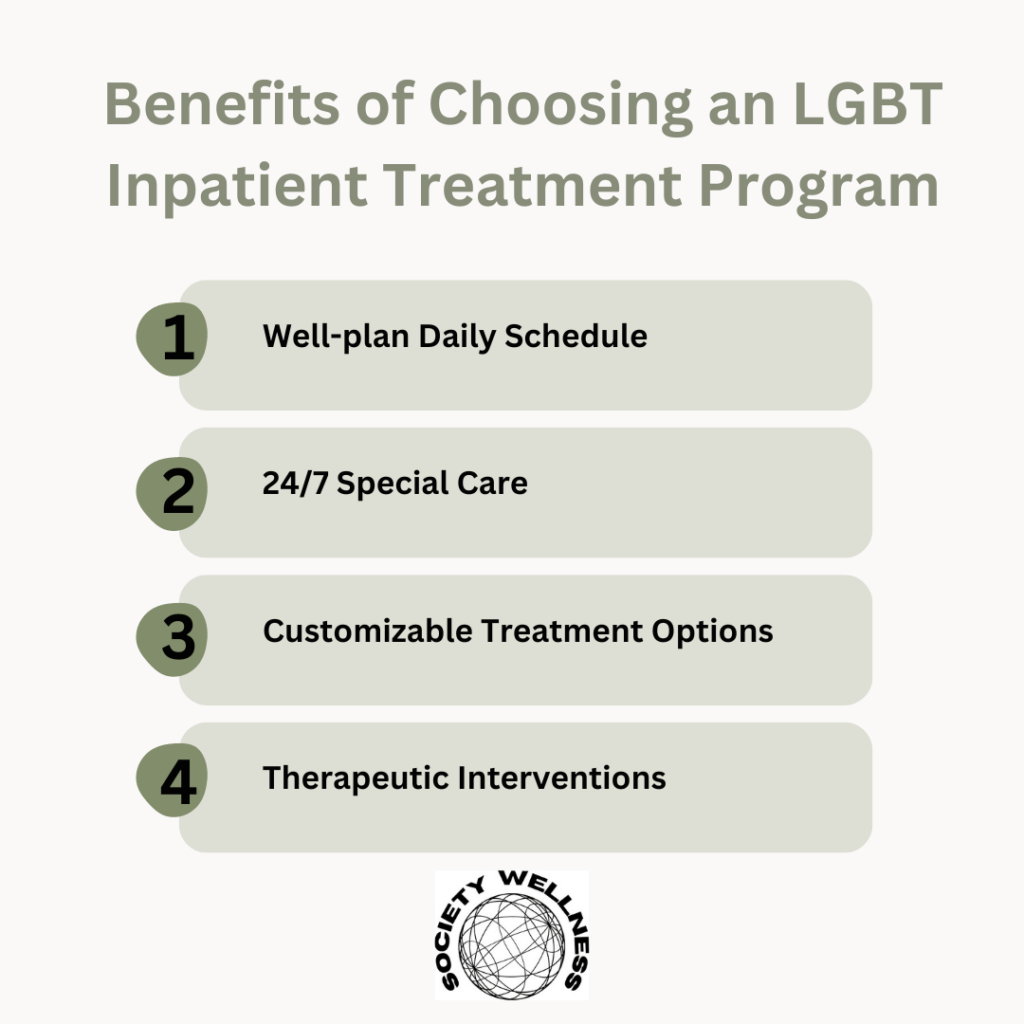When it comes to addiction recovery, finding a treatment program that aligns with your unique needs and experiences can make a significant difference. For members of the LGBTQ+ community, the journey to recovery often involves distinct challenges related to identity, discrimination, and social stigma. Looking for the best rehab Center for your addiction recovery journey? When seeking assistance for a substance use disorder (SUD), you will learn that many degrees of care are available. These care levels can be divided into two main categories: inpatient and outpatient treatment.
However, the severity of the SUD will mostly determine how intensive a treatment program needs to be. The inpatient setting is best for patients with moderate to severe SUD. Continue reading to find out why inpatient treatment programs are beneficial.
Inpatient Treatment: A Detailed Overview!
An inpatient treatment program is often known as residential treatment. It is designed for Individuals coping with severe addiction, mental health concerns, or co-occurring disorders. Inpatient treatment necessitates that patients remain at the treatment center for the whole course of their rehabilitation program, in contrast to outpatient programs. With the distractions and stressors of daily life removed, this immersion method provides a safe haven where people can concentrate solely on their healing.
The following activities are involved in the Inpatient treatment program:
- Group sessions
- Family sessions
- 12-step program
- Skill-building sessions
- Education about addiction and preventive tips
- Fitness activities
- Holistic activities
- Withdrawal management
- MSR
When you sign up for an inpatient rehabilitation program, an intake interview and assessment are the first things a person will do. Through this approach, the intake clinician can get medical, mental health, and substance use records.
Who Is Eligible for Inpatient Care?
Inpatient care is especially advantageous for those who:
- Possess serious mental health issues or addictions that call for extensive treatment.
- Have experienced multiple relapses after trying outpatient treatment in the past.
- To escape triggers and harmful influences.
- Ensure that you have medical supervision during the detox process.
- Are coping with co-occurring disorders that require interdisciplinary care.
The Benefits of Choosing an LGBT Inpatient Treatment Program
- Well-plan Daily Schedule
The inpatient program is beneficial for someone starting their recovery path to be in a regulated and predictable atmosphere. It adheres to a rigid daily routine. The regular daily plan aids in the person’s establishment of new, healthy routines and keeps them actively involved in their rehabilitation process throughout the day.

- 24/7 Special Care
Inpatient treatment facilities offer 24-hour care from a multidisciplinary team of medical specialists, including nurses, therapists, doctors, and support personnel. This ongoing supervision guarantees that patients receive emergency medical care when necessary and receive emotional and mental support during their stay.
- Customizable Treatment Options
Every client in the inpatient program receives a customized treatment plan. This makes it possible to provide focused, intense therapy that takes into account both the particular substance or substances implicated and any co-occurring mental health disorders. A person with a drug use disorder and a coexisting mental health illness, such as anxiety or depression, is said to have a co-occurring condition.
- Therapeutic Interventions
To address the underlying problems causing addiction or mental health disorders, inpatient treatment entails a variety of therapeutic interventions. Family therapy, trauma-informed treatment, dialectical behavior therapy, and cognitive-behavioral therapy (CBT) are examples of common therapies. These treatments support patients in overcoming prior traumas, enhancing emotional regulation, and learning coping mechanisms.
1. A Safe and Inclusive Environment
One of the most important aspects of LGBTQ inpatient rehab is the creation of a safe, inclusive space where individuals can openly express their identity without fear of judgment. Traditional rehab centers may not always fully understand or acknowledge the unique struggles that LGBTQ individuals face, such as discrimination, rejection, or trauma related to their sexual orientation or gender identity.
In LGBTQ-focused rehab programs, staff and peers alike foster a sense of acceptance and understanding, which allows patients to feel more comfortable sharing their experiences. This inclusive atmosphere can greatly improve the effectiveness of treatment, as individuals are more likely to engage in therapy and open up about their struggles.
2. Addressing LGBTQ-Specific Issues
LGBTQ individuals often face specific challenges that can contribute to or exacerbate substance abuse, including:
- Discrimination and Stigma: Many LGBTQ individuals encounter prejudice, discrimination, or bullying, leading to feelings of isolation or low self-esteem. These experiences can drive people toward substances as a way to cope.
- Family Rejection: Some individuals in the LGBTQ community experience rejection or strained relationships with their families, which can have a lasting emotional impact and increase the likelihood of substance abuse.
- Mental Health Concerns: LGBTQ individuals may be at higher risk for mental health conditions such as depression, anxiety, or PTSD due to societal pressures and discrimination. These co-occurring disorders often need to be treated alongside addiction.
LGBTQ inpatient rehab centers are equipped to address these specific challenges. Therapists and counselors are trained to understand the intersection of addiction and identity, offering targeted support that addresses the root causes of substance use in the LGBTQ community.
3. Culturally Competent Care
Culturally competent care is essential for successful addiction treatment, especially for marginalized groups. LGBTQ inpatient rehab programs employ staff who are experienced in working with LGBTQ individuals and who understand the cultural nuances of their experiences. This includes awareness of the mental and emotional toll of discrimination, family rejection, and challenges related to coming out.
In such a supportive environment, individuals can receive therapy and care that is both respectful of their identity and tailored to their unique needs. This level of understanding can help to build trust between patients and healthcare providers, making the recovery process more effective.
4. Holistic Treatment Approaches
LGBTQ inpatient rehab centers often take a holistic approach to addiction recovery, addressing both the physical aspects of addiction and the emotional and psychological factors that contribute to substance use. Treatment plans may include:
- Individual Therapy: LGBTQ-specific therapy helps individuals work through personal struggles related to their identity, past trauma, and co-occurring mental health disorders.
- Group Therapy: Group sessions in an LGBTQ setting allow individuals to connect with others who share similar experiences. This sense of community and shared understanding can be incredibly healing.
- Family Therapy: In cases where family rejection or strained relationships are a concern, family therapy can help repair these bonds or provide support for establishing boundaries.
- Alternative Therapies: Many LGBTQ inpatient rehab centers offer complementary therapies such as yoga, meditation, art therapy, and mindfulness practices that help patients manage stress and develop healthy coping mechanisms.
5. Building a Supportive Community
Community plays a crucial role in long-term recovery, and LGBTQ inpatient rehab programs provide a unique opportunity to build meaningful connections with others who share similar experiences. Patients are surrounded by peers who understand the challenges of being LGBTQ in a world that can sometimes be unwelcoming. This sense of solidarity can reduce feelings of isolation and help individuals feel empowered in their recovery.
Many LGBTQ inpatient rehab centers also emphasize building a lasting support network for patients after they leave treatment. This may include connecting individuals with LGBTQ-friendly 12-step programs, support groups, and community organizations that can offer continued encouragement and resources throughout their recovery journey.
6. Preventing Relapse with Targeted Aftercare
Aftercare is a critical component of addiction recovery, helping individuals transition back into everyday life while maintaining sobriety. LGBTQ inpatient rehab programs often provide specialized aftercare services that cater to the unique needs of LGBTQ individuals. This may include:
- LGBTQ-Specific Support Groups: Ongoing peer support can make a significant difference in preventing relapse. LGBTQ-focused support groups provide a safe space to share experiences, challenges, and successes with others who understand the journey.
- Mental Health Services: Continued mental health care is essential for those dealing with co-occurring disorders like anxiety, depression, or trauma. LGBTQ inpatient rehab centers often provide ongoing therapy or connect individuals with LGBTQ-friendly therapists and counselors.
- Relapse Prevention Plans: Developing a personalized relapse prevention plan is key to long-term success. LGBTQ rehab programs work with individuals to identify triggers and develop coping strategies that align with their personal experiences and challenges.
Start your Healthier Journey with Society Wellness
We know that LGBTQ+ people have particular difficulties. Our Inpatient program is specially made to offer a secure, accepting environment where you can receive the help you require to get well. Together, you and our team of therapists, counselors, and psychiatrists develop a personalized treatment plan that takes into account your unique requirements, objectives, and situation. We promise you that you’ll receive care that is specific to your identity and life circumstances. Get in touch with us today at: (888) 598-9510
FAQs: Benefits of Choosing LGBTQ+ Inpatient Rehab
What is LGBTQ+ inpatient rehab?
LGBTQ+ inpatient rehab programs are specialized treatment centers that cater specifically to the needs of LGBTQ+ individuals struggling with addiction. These programs offer a safe and supportive environment where individuals can address both their addiction and any underlying mental health issues, while also feeling accepted and understood.
Why is LGBTQ+ inpatient rehab important?
LGBTQ+ inpatient rehab programs are important because they provide a safe and inclusive space for individuals to recover from addiction. These programs can help individuals address the unique challenges that LGBTQ+ people may face, such as discrimination, stigma, and minority stress.
How do LGBTQ+ inpatient rehab programs differ from traditional addiction treatment programs?
LGBTQ+ inpatient rehab programs differ from traditional addiction treatment programs in several ways. They offer a more inclusive and affirming environment, and they are staffed by professionals who are trained to address the unique needs of LGBTQ+ individuals.
Are LGBTQ+ inpatient rehab programs effective?
Studies have shown that LGBTQ+ inpatient rehab programs are effective in helping individuals recover from addiction. These programs can provide individuals with the support and resources they need to achieve long-term sobriety.
